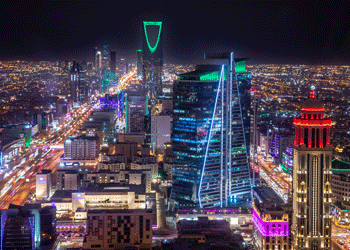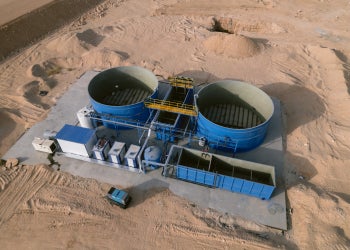EPC teams start forming for $22bn Dubai tunnels
24 September 2024
Register for MEED's 14-day trial access
Some prequalified engineering, procurement and construction (EPC) companies for the contracts to develop and operate various packages of the $22bn Dubai Strategic Sewerage Tunnels (DSST) project have started forming teams in anticipation of the next stage of the tendering process.
In August, Dubai Municipality prequalified 21 companies and consortiums that can bid for three packages known as J1, J2 and W, and 19 for a fourth package known as J3, of the six-package project.
Some companies are in the process of finalising their partners, while at least one has said it does not intend to tap a partner.
While the country of origin is expected to play a role in the formation of teams, it is expected that the complementarity of the companies' expertise and resources will be crucial in the selection process.
The client and its advisers have opted to prequalify EPC contractors ahead of investors in a departure from the classic public-private partnership (PPP) procurement process.
"The idea is to issue the technical information pack to the prequalified EPC contractors before the prequalification process for investors starts, allowing EPC contractors time to undertake the design process," a source familiar with the project recently told MEED.
He added: "These designs should be ready once Dubai Municipality completes the prequalification process for investors, saving roughly three months compared to the usual route, where the prequalification processes for developers and EPC contractors are done simultaneously."
The staggered prequalification process is expected to help ensure the request for proposals process takes about six months rather than the typical nine months.
Six packages
Under the current plan, the $22bn DSST project is broken down into six packages, which will be tendered as PPP packages with concession periods lasting between 25 and 35 years.
The first package, J1, comprises Jebel Ali tunnels (North) and terminal pump stations (TPS). The tunnels will extend approximately 42 kilometres, and the links will extend 10 kilometres (km).
The second package, J2, covers the southern section of the Jebel Ali tunnels, which will extend 16km and have a link stretching 46km.
W for Warsan, the third package, comprises 16km of tunnels, TPS and 46km of links.
J3, the fourth package, comprises 129km of links.
J1, J2 and W will be procured under a design-build-finance-operate-maintain model with a concession period of 25-35 years.
J3 will be procured under a design-build-finance model with a concession period of 25-35 years. Once completed, Dubai Municipality will operate them, unlike the first three packages, which are planned to be operated and maintained by the winning PPP contractors.
J1, J2, W and J3 will comprise the deep sewerage tunnels, links and TPS (DLT) components of the overall project.
The project’s remaining two packages entail the expansion and upgrade of the Jebel Ali and Warsan sewage treatment plants (STPs), and will be procured in a process separate from the four DSST-DLT components.
Prequalified EPC contractors
The prequalified EPC companies for packages J1, J2 and W are:
- Acciona Construccion (Spain) – Dubai branch
- Besix Construct (Belgium)
- China Harbour Engineering (China)
- China Railway Group (China)
- China State Construction Engineering Corporation (China)
- Daewoo Engineering & Construction (South Korea)
- Dogus Insaat VE Ticaret Anonim Sirketi (Turkiye) – Abu Dhabi
- FCC Construcccion (Spain)
- Archirodon Construction (Overseas) Company (Greece) / BESSAC (France)
- China Civil Engineering Construction Corporation – Dubai Branch / Shanghai Tunnel Engineering Company (STEC) / China Railway 14th Bureau Group Corporation
- Gulermak Agir Sanayi Insaat (Turkiye) / DETech Contracting (local)
- National Marine Dredging Company (local) / Afcons Infrastructure (India) / ITD Cementation India
- The Arab Contractors (Osman Ahmed Osman & Company, Egypt) / Darwish Engineering Emirates (local) / AqualiaMACE Contracting Operation & General Maintenance (local)
- Larsen & Toubro (India)
- Porr (Austria)
- Power Construction Corporation of China (China) – Dubai branch
- Samsung C&T Corporation (South Korea) – Dubai Branch
- SK Ecoplant (South Korea)
- Strabag Dubai (Austria)
- The Petroleum Projects & Technical Consultation Company (Petrojet) – Egypt
- Webuild (Italy)
EPC companies that have been prequalified for package J3 are:
- Acciona Construccion (Spain) – Dubai branch
- Alghanim International General Trading & Contracting (Kuwait)
- China Railway Group (China)
- China State Construction Engineering Corporation (China)
- Daewoo Engineering & Construction (South Korea)
- DETech Contracting
- Archirodon Construction (Overseas) Company (Greece) / BESSAC (France)
- China Civil Engineering Construction Corporation (China) – Dubai branch / Shanghai Tunnel Engineering Company (STEC) / China Railway 14th Bureau Group Corporation
- Gulermak Agir Sanayi Insaat (Turkiye) / DETech Contracting (local)
- International Foundation Group (IFG, local) / General Construction Company (local)
- Nael Construction & Contracting (UAE) / Concord for Engineering & Contracting (Egypt) – Dubai branch
- National Marine Dredging Company (local) / Afcons Infrastructure (India) / ITD Cementation India
- Mapa Insaat Ve Ticaret (Turkiye)
- Mohammed Abdulmohsin Al-Kharafi & Sons (Kuwait)
- Porr (Austria)
- Power Construction Corporation of China – Dubai branch
- Strabag (Austria)
- Tecton Engineering & Construction (local)
- The Petroleum Projects & Technical Consultation Company – Petrojet (Egypt)
Market-sounding
Dubai Municipality is expected to hold a market-sounding event for investors, MEED reported in early September .
The event is set to take place during the first week of October, a few weeks before interested investors submit their statements of qualifications (SOQ) for the projects' various packages.
MEED previously reported that the client had extended the SOQ submission deadline from 5 September to 21 October.
Gravity system project
The DSST project aims to convert Dubai’s existing sewerage system from a pumped system to a gravity system by decommissioning the existing pump stations and providing “a sustainable, innovative, reliable service for future generations”.
Dubai currently has two major sewerage catchments. The first in Deira is Warsan, where the Warsan STP treats the flow.
The second catchment is in Bur Dubai, where the wastewater is treated at the Jebel Ali STP.
According to a source close to the project, the DSST will replace 120 pump stations, saving approximately 100 gigawatt-hours of electricity annually.
Exclusive from Meed
-
 Solar deals signal Saudi Arabia’s energy ambitions
Solar deals signal Saudi Arabia’s energy ambitions13 February 2026
-
 Saudi Arabia appoints new investment minister
Saudi Arabia appoints new investment minister13 February 2026
-
 Indian firm wins major Oman substation contract
Indian firm wins major Oman substation contract12 February 2026
-
 Developers appoint contractor for $500m wastewater treatment project
Developers appoint contractor for $500m wastewater treatment project12 February 2026
-
 Dewa raises Empower stake in $1.41bn deal
Dewa raises Empower stake in $1.41bn deal12 February 2026
All of this is only 1% of what MEED.com has to offer
Subscribe now and unlock all the 153,671 articles on MEED.com
- All the latest news, data, and market intelligence across MENA at your fingerprints
- First-hand updates and inside information on projects, clients and competitors that matter to you
- 20 years' archive of information, data, and news for you to access at your convenience
- Strategize to succeed and minimise risks with timely analysis of current and future market trends

Related Articles
-
 Solar deals signal Saudi Arabia’s energy ambitions
Solar deals signal Saudi Arabia’s energy ambitions13 February 2026
 Commentary
Commentary
Mark Dowdall
Power & water editorSaudi Arabia’s recent agreement to build $2bn-worth of solar power plants in Turkiye is the latest sign that the kingdom’s energy influence is changing.
Historically, this was measured in oil barrels and export volumes. Increasingly, this is extending to capital, structuring expertise and the ability to deliver record-low tariffs in competitive markets.
Announcing the deal, Turkish Energy Minister Alparslan Bayraktar said tariffs for the plants would be the country’s lowest on record, with electricity purchased under 25-year power purchase agreements.
It followed another announcement, in January, that Acwa is investing $200m to build a large-scale solar photovoltaic (PV) plant in the Philippines.
Whether Saudi-backed companies ultimately retain long-term stakes or primarily develop and build the assets, their role at the front end is significant.
Sponsors that bring sovereign backing, clear procurement processes and access to low-cost financing can influence tariffs and contract terms from the outset.
There is also a geopolitical layer. Investing in Turkiye, or anywhere for that matter, strengthens political and economic ties at a time when regional alignments are shifting.
Energy infrastructure is also long-term by its nature. It connects ministries, regulators, lenders and operators in relationships that often extend well beyond a single transaction.
Saudi Arabia has spent the past few years refining its approach to pricing, structuring and financing large-scale renewables at home.
Exporting that expertise may not rival oil in scale or visibility, but it does signal that Saudi Arabia is becoming more than just an energy supplier.
Increasingly, it is becoming a participant in how other countries design and finance their energy transitions. That influence is still significant.
https://image.digitalinsightresearch.in/uploads/NewsArticle/15645903/main.jpg -
 Saudi Arabia appoints new investment minister
Saudi Arabia appoints new investment minister13 February 2026
Register for MEED’s 14-day trial access
King Salman Bin Abdulaziz Al-Saud has made a series of senior government changes, including Khalid Al-Falih leaving his role as investment minister to become minister of state and a member of the cabinet.
Al-Falih has been replaced by Fahad Al-Saif as investment minister. Al-Saif has been head of the Investment Strategy and Economic Insights Division at the Public Investment Fund (PIF) since 2024. That role involved formulating PIF’s long-term investment strategy. He has also served as head of the Global Capital Finance Division, a role he has held since joining PIF in 2021.
The change of investment minister comes at a time when securing investments has become a key priority for Saudi Arabia as it prepares to hand over more projects to the private sector for delivery.
King Salman also named Abdullah Al-Maghlouth as vice-minister of media and Abdulmohsen Al-Mazyad as vice-minister of tourism. Khalid Al-Yousef was named attorney general, and Sheikh Ali Al-Ahaideb will serve as president of the Board of Grievances.
Faihan Al-Sahli was selected as director general of the General Directorate of Investigation, while Abdulaziz Al-Arifi was chosen to lead the National Development Fund. Haytham Al-Ohali will head the Communications, Space and Technology Commission, and Fawaz Al-Sahli will chair the Transport General Authority.
https://image.digitalinsightresearch.in/uploads/NewsArticle/15645415/main.gif -
 Indian firm wins major Oman substation contract
Indian firm wins major Oman substation contract12 February 2026

India’s Larsen & Toubro has won a contract to build the Majan 400/220/132kV grid station in Oman.
Estimated to cost $100m, the project includes an associated 400kV line-in line-out underground cable from Sohar Free Zone to the Sohar Interconnector Station.
The contract was awarded by Oman Electricity Transmission Company (OETC), part of the government-owned Nama Group.
The grid station will comprise eight 400kV gas-insulated switchgear (GIS) bays, eight 220kV GIS bays and 10 132kV GIS bays at the new Sohar Free Zone substation.
The scope includes the installation of two 500MVA, 400/220kV transformers and two 500MVA, 220/132kV transformers.
Local firm Monenco Consulting Engineers was appointed in April last year to provide design and supervision services for the project.
As MEED exclusively revealed, the main contract was tendered in June, as part of three significant contracts to build new substations in the sultanate.
The second contract, worth about $35m, covers the construction of the Sultan Haitham City 132/33kV grid station and associated 132kV line-in line-out underground cables running 4 kilometres from Mabella to Mabella Industrial Zone.
The third contract, valued at about $100m, covers the construction of the Surab 400/33kV grid station and an associated 400kV line-in line-out cable from the Duqm grid station to the Mahout grid station.
Local firms Muscat Engineering Consulting and Hamed Engineering Services are consultants for the Sultan Haitham City and Surab projects, respectively.
The two remaining contracts are currently under bid evaluation, with awards expected this quarter.
https://image.digitalinsightresearch.in/uploads/NewsArticle/15638107/main.jpg -
 Developers appoint contractor for $500m wastewater treatment project
Developers appoint contractor for $500m wastewater treatment project12 February 2026

Register for MEED’s 14-day trial access
Egypt’s Orascom Construction has won the engineering, procurement and construction (EPC) contract for a major wastewater treatment project in Saudi Arabia’s Eastern Province.
A consortium of Saudi utilities provider Marafiq, the regional business of France’s Veolia and Bahrain/Saudi Arabia-based Lamar Holding is developing the $500m (SR1.875bn) industrial wastewater treatment plant (IWWTP) in Jubail Industrial City 2.
Sources close to the project confirmed the appointment to MEED, adding that the project has now entered the construction phase.
Industry sources also said that financial close on the project is expected to be reached in the coming days.
In September, the developer consortium was awarded a contract, under a 30-year concession agreement, by Saudi Aramco Total Refining & Petrochemical Company (Satorp), a joint venture of Saudi Aramco and France’s TotalEnergies.
The planned facility will treat and recycle wastewater from Satorp’s under-construction Amiral chemical derivatives complex, also in Jubail.
Marafiq, formally Power & Water Utility Company for Jubail and Yanbu, will own a 40% stake in the dedicated project company. Veolia Middle East SAS will hold a 35% stake, and Lamar Holding’s Lamar Arabia for Energy will hold the other 25%.
The planned IWWTP, which will primarily serve the $11bn sprawling Amiral chemicals zone, will implement advanced water treatment and recovery technologies to process complex industrial effluents, including spent caustic streams. Treated water will be reintegrated into the industrial processes, supporting closed-loop reuse and energy efficiency.
The project follows a concession-style model, akin to a public-private partnership (PPP), where the developer consortium invests in, builds and operates the wastewater plant over a 30-year period, with returns linked to service delivery.
Marafiq has been involved in several similar projects across Saudi Arabia, including as the sole owner of the Jubail industrial water treatment plant (IWTP8), which treats complex industrial effluents for petrochemical and heavy industrial companies.
In 2020, Saudi Services for Electro Mechanic Works was awarded the $202m main contract for the fourth expansion phase of IWTP8. Construction works on the project are expected to be completed by the end of the quarter.
 READ THE FEBRUARY 2026 MEED BUSINESS REVIEW – click here to view PDF
READ THE FEBRUARY 2026 MEED BUSINESS REVIEW – click here to view PDFSpending on oil and gas production surges; Doha’s efforts support extraordinary growth in 2026; Water sector regains momentum in 2025.
Distributed to senior decision-makers in the region and around the world, the February 2026 edition of MEED Business Review includes:
> AGENDA: Mena upstream spending set to soar> INDUSTRY REPORT: MEED's GCC water developer ranking> INDUSTRY REPORT: Pipeline boom lifts Mena water awards> MARKET FOCUS: Qatar’s strategy falls into place> CURRENT AFFAIRS: Iran protests elevate regional uncertainty> CONTRACT AWARDS: Contract awards decline in 2025> LEADERSHIP: Tomorrow’s communities must heal us, not just house us> INTERVIEW: AtkinsRealis on building faster> LEADERSHIP: Energy security starts with rethinking wasteTo see previous issues of MEED Business Review, please click herehttps://image.digitalinsightresearch.in/uploads/NewsArticle/15637523/main.jpg -
 Dewa raises Empower stake in $1.41bn deal
Dewa raises Empower stake in $1.41bn deal12 February 2026
Dubai Electricity & Water Authority (Dewa) has announced it has increased its stake in Emirates Central Cooling Systems Corporation (Empower) from 56% to 80%.
The transaction was completed through the purchase of 2.4 billion shares and the transfer of the entire ownership of Emirates Power Investment (EPI), which is wholly owned by Dubai Holding.
The total value of the deal is AED5.184bn ($1.41bn).
Empower currently holds over 80% of Dubai’s district cooling market and operates 88 district cooling plants across the emirate.
According to MEED Projects, the UAE’s district cooling sector currently has nine projects worth $1.29bn in the pre-execution phase.
Empower has ownership in four of these projects, which have a combined value of $472m.
This includes a $200 million district cooling plant at Dubai Science Park, with a total capacity of 47,000 refrigeration tonnes serving 80 buildings.
Empower signed a contract to design the plant last August, with construction scheduled to begin by the end of the first quarter of 2026.
The utility is also building a district cooling plant at Dubai Internet City.
UAE-based TMF Euro Foundations was recently appointed as the enabling and piling subcontractor for the project.
https://image.digitalinsightresearch.in/uploads/NewsArticle/15635949/main.jpg


